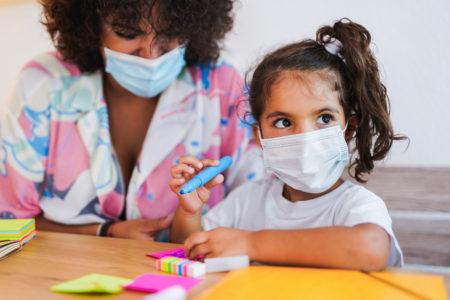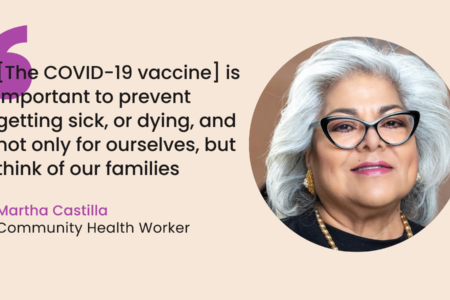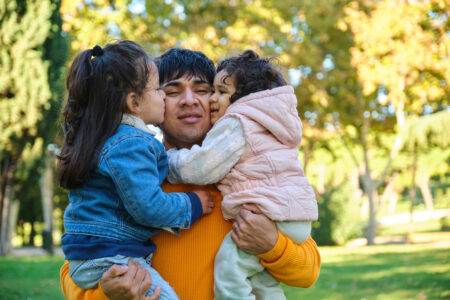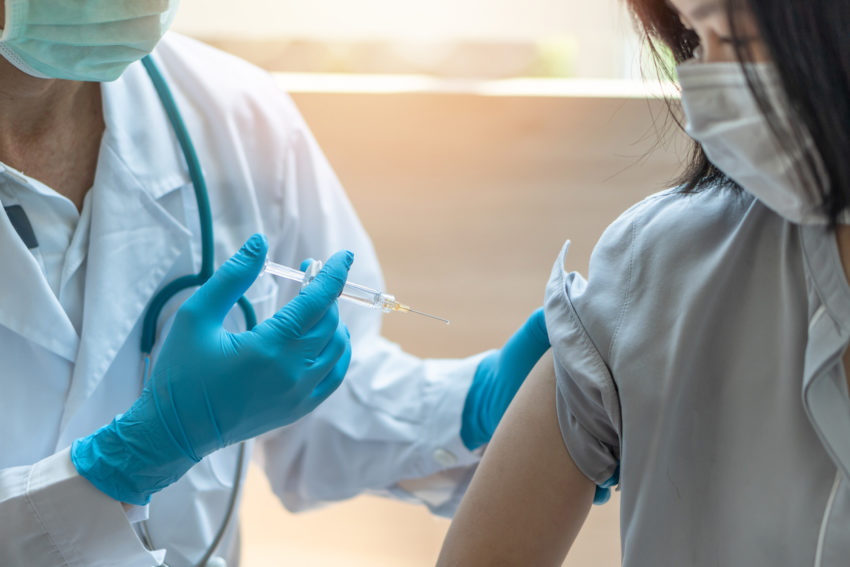
Share On Social!
As the Pfizer-BioNTech, Moderna, and Johnson & Johnson COVID-19 vaccines continue to be distributed across the country, we’re getting closer to herd immunity and ending the pandemic.
One obstacle on this path is vaccine skepticism.
Vaccine skepticism is caused by a variety of sources, such as historical trauma from healthcare mistreatment and misinformation about vaccines that is circulated on social media.
Misinformation about vaccines is especially dangerous as it will often target Latino and Black communities, which have been disproportionately affected by COVID-19 and are communities that most need the vaccine.
Let’s go over the most common questions about COVID-19 vaccines, who is causing the spread of misinformation, and how to address it and build trust in Latino communities.
QUESTION: Will the vaccines give me the COVID-19 virus?
ANSWER: None of the authorized vaccines will inject you with the COVID-19 virus.
“The first two COVID-19 vaccines that are available in the U.S. contain a strand of genetic material called mRNA. When the mRNA enters your cells, it instructs them to make a piece of the ‘spike’ protein that’s present on the coronavirus that causes COVID-19. Those protein pieces don’t actually harm your body, but they do trigger your immune system to mount a response to fight them off,” says Dr. Thaddeus Stappenbeck, Chairman of the Department of Inflammation and Immunity at Cleveland Clinic’s Lerner Research Institute, according to Cleveland Clinic.
Unlike the Moderna and Pfizer-BioNTech vaccines that are made from mRNA particles, the Johnson & Johnson is made from an adenovirus, which is a type of virus usually in a common cold.
“This adenovirus is just a way to carry instructions to your immune system – it is genetically modified so that it cannot give you a cold. The piece of COVID-19 DNA also does not give you an infection. This vaccine helps your immune system recognize the COVID-19 virus, and develop antibodies to protect you from future infection,” according to the Vanderbilt Institute for Clinical and Translational Research.
QUESTION: Will I test positive for COVID-19 after taking a vaccine?
ANSWER: After taking any of the authorized vaccines and waiting the appropriate suggested time to reach immunity, you will not test positive for a COVID-19 viral test, according to the CDC.
“None of the authorized and recommended COVID-19 vaccines cause you to test positive on viral tests, which are used to see if you have a current infection. Neither can any of the COVID-19 vaccines currently in clinical trials in the United States. If your body develops an immune response to vaccination, which is the goal, you may test positive on some antibody tests,” according to the CDC.
QUESTION: Will the vaccine alter or affect my DNA?
ANSWER: None of the COVID-19 vaccines will change your DNA. The Moderna and Pfizer-BioNTech vaccines are made from mRNA, but that will not change anything about your own DNA.
“Messenger RNA is something that’s made from DNA, but it’s not designed to integrate with our DNA, and it doesn’t permanently change our genome and who we are in any way,” Dr. Stappenbeck says according to Cleveland Clinic.
QUESTION: What are the COVID-19 vaccines made of?
ANSWER: Both Pfizer and Moderna vaccines consist of mRNA particles, lipids, acids, salts, and sugar. The Johnson & Johnson vaccine consists of adenovirus, particles of the COVID-19 proteins, lipids, acids, salts, and sugar.
The ingredients are safe, standard, and publicly available. Companies have been transparent about the ingredients throughout the process.
“Overall, the main ingredients in the Pfizer-BioNTech and Moderna vaccines are very similar, both vaccines were found to be safe and efficacious in preventing symptomatic COVID-19 disease in rigorously conducted clinical trials,” says Dr. Juan Ravell, division chief of allergy and immunology at Hackensack University Medical Center, according to Hackensack Meridian Health.
QUESTION: Can we trust that the COVID-19 vaccine is safe even though it was produced quickly?
ANSWER: COVID-19 vaccines are being produced and authorized faster than vaccines in the past have been for other pandemics and viruses. The COVID-19 vaccines were produced faster because of more funding, urgency, and years of prior research.
In the past, vaccines have taken a longer time to reach the public because of a lack of funding and resources.
With the COVID-19 vaccines, companies around the world have dedicated billions of dollars to help fund the efforts to fight the virus, because everyone recognizes how important it is to reach immunity.
Even though COVID-19 vaccines have only been in development for the last year, it will be safe for the public because of the rigorous clinical trials that they have gone through.
QUESTION: Is the Johnson & Johnson Vaccine unsafe? Will it give me blood clots?
ANSWER: After finding an extremely small risk of blood clotting (only six cases in over 6.8 million people vaccinated), there was a pause in the Johnson & Johnson vaccine distribution; a CDC panel investigated and determined the risk is small enough to continue distribution, lifting the pause.
On April 13, 2021, the CDC and FDA recommended a pause in the distribution of the Johnson & Johnson vaccine as an abundance of caution. This was due to an extremely rare blood clotting disorder called cerebral venous sinus thrombosis that was discovered in six women ages 18 to 59 out of more than 6.8 million people who had received the Johnson & Johnson vaccines in the previous weeks.
Although the risk was extremely small, the CDC and FDA recommended states to pause distribution of the Johnson & Johnson vaccine to adequately examine the risk.
After a CDC panel investigated the blood clot cases, they recommended on April 23, 2021 that the FDA to lift the pause of the Johnson & Johnson vaccine and determined the risk is small enough to continue distribution.
“The identification of what is approximately a less than 2-in-a-million risk associated with the Johnson & Johnson vaccine is a sign that the nation’s safety monitoring system for COVID vaccines is working. After any vaccine is successful in clinical trials and approved for use, the FDA continues to monitor it for safety. The pause in the use of the J&J vaccine allowed scientists to evaluate each incidence of the clotting disorder. They determined that the level of risk was very low and that the benefits of continued use of the J&J vaccine greatly outweighed any risk associated with it,” according to Public Health Collaborative.
Who is Spreading COVID-19 Misinformation?
Knowing the facts and answers to common questions about the COVID-19 vaccines helps build vaccine confidence.
Unfortunately, vaccine confidence is brought down by people who spread misinformation about the COVID-19 vaccines on social media.
The majority of misinformation on Facebook and Twitter comes from 12 prominent anti-vaccine leaders known as the “Disinformation Dozen,” according to a new report by the Center for Countering Digital Hate (CCDH) and Anti-Vax Watch.
“The Disinformation Dozen are twelve anti-vaxxers who play leading roles in spreading digital misinformation about Covid vaccines. They were selected because they have large numbers of followers, produce high volumes of anti-vaccine content or have seen rapid growth of their social media accounts in the last two months,” according to the report.
The “Disinformation Dozen” are the following 12 individuals who spread anti-vaccine content on social media:
- Joseph Mercola
- Robert F. Kennedy, Jr.
- Ty and Charlene Bollinger
- Sherri Tenpenny
- Rizza Islam
- Rashid Buttar
- Erin Elizabeth
- Sayer Ji
- Kelly Brogan
- Christiane Northrup
- Ben Tapper
- Kevin Jenkins
Over 65% of anti-vaccine content on Facebook and Twitter can be attributed to these 12 individuals or the organizations affiliated with them.
These individuals often explicitly target skeptical Latinos and Black people through their anti-vaccine content.
“Kennedy and Children’s Health Defense released a film in mid-March targeting members of the Black and Latino communities with tailored anti-vaccine messages. Facebook and Twitter continue to allow him a platform to promote these false claims,” according to the report.
The report indicates that despite repeated violations of the social media platforms’ policies on misinformation, the social media giants have failed to remove the false information and suspend the accounts.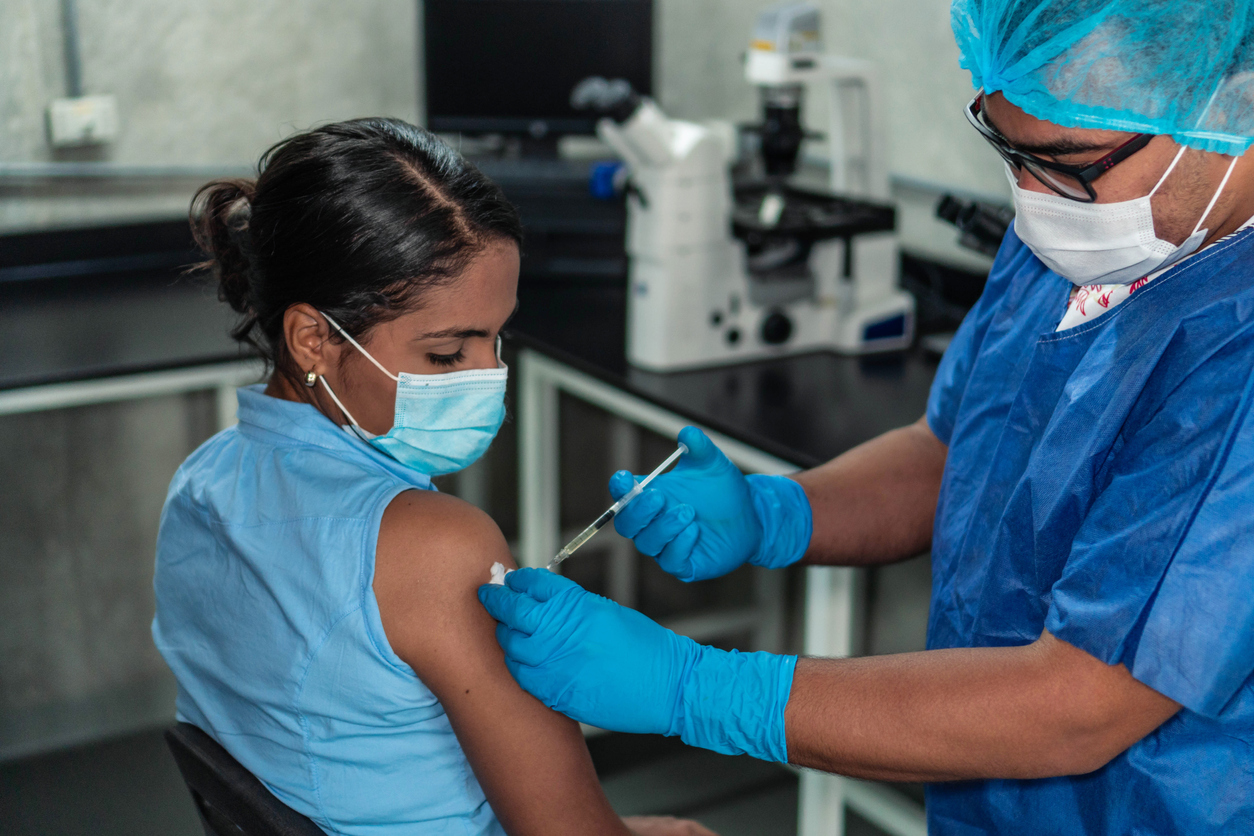
“Despite repeatedly violating Facebook, Instagram and Twitter’s terms of service agreements, nine of the Disinformation Dozen remain on all three platforms, while just three have been comprehensively removed from just one platform. This is an extension of platforms’ failure to act on vaccine misinformation. Research conducted by CCDH last year has shown that platforms fail to act on 95 percent of the Covid and vaccine misinformation reported to them, and we have uncovered evidence that Instagram’s algorithm actively recommends similar misinformation,” according to the report.
Social media platforms must step up and do more to protect users from misinformation, especially when it comes to public health and safety, according to the report.
Top Remaining Concerns for Latinos about Vaccines
Communities of color tend to be more skeptical of the COVID-19 vaccines. This can be due to historical trauma and/or mistrust of government.
A Fall 2020 study by the COVID Collaborative, a nonprofit coalition made up of Langer Research Associates, Unidos US, and the NAACP, measured hesitancy about the safety of a COVID-19 vaccine in Black and Latino communities before the COVID-19 vaccines were authorized. Their findings showed:
- 66% of Latinos and 86% of Black people do not believe the vaccine will be safe
- 60% of Latinos and 82% of Black people do not trust that the vaccine will be effective
- The majority of Latino (66%) and Black people (72%) are likely to trust their community leaders and health care providers when it comes to a vaccine
The top concerns for Latinos regarding COVID-19 vaccines are safety, cost, diversity in the clinical trials, and availability for undocumented people, according to a toolkit by the Ad Council and COVID Collaborative.
“The COVID-19 vaccines are available for the undocumented community. Health providers should not discriminate against undocumented individuals from getting the COVID-19 vaccines. Some personal information might be request, and the personal information requested will vary by site. Although fear is a reality for the undocumented community when giving out personal information, it is important to seek information from community allies,” according to the toolkit.
Find COVID-19 vaccine locations near you in English or Spanish!
Top Ways to Address Latino Vaccine Hesitancy
We can build vaccine confidence for Latino communities through these methods:
- Use Clear and Accessible Messaging
We can build trust by using clear and accessible messaging, such as simple language that avoids difficult terminology and can help with understanding.
- Be Credible and Transparent
It’s important that we provide credible and transparent information about the vaccine and not make any claims that aren’t verified by medical experts.
- Uplift Local Leaders in Communities of Color
One of the most important ways to build vaccine confidence is through uplifting local leaders in communities of color, like the Latino community. Having ambassadors to address vaccine questions and concerns helps calm fears that the vaccines weren’t developed with these vulnerable populations in mind.
- Build Cultural Humility
Cultural humility means being aware of how history and culture intersect to affect people’s beliefs, especially when it comes to historical trauma and wrongdoing, according to the Hogg Foundation for Mental Health. Building vaccine confidence will require knowledge of the intersection of history and culture.
- Be Respectful and Empathetic
It’s important to approach hesitant communities with respect and empathy. Dismissing people’s concerns, even if rooted in misinformation or conspiracy, may invalidate or upset people who are just looking for answers.
Read more about these ways here.
Find COVID-19 vaccine locations near you in English or Spanish!
How Can We Tackle Misinformation?
When we encounter misinformation on social media, it’s important that we do something about it.
Here are some steps we can take when encountering misinformation about COVID-19.
- Correct it when you can.
“Re-sharing the original with a comment can sometimes help to amplify the original source. A better idea, used by some professional fact-checkers, is to take a screen shot of the image or video, and then draw a red X through it and share that,” according to the Washington Post.
- Don’t share content without examining it first.
“People are too quick to share information they can’t personally vouch for. Especially if you have a strong reaction, use that as a reminder to step away. Stop looking at it, then come back in a few minutes and ask yourself: ‘Do I really know enough to share this?’” according to the Washington Post.
- Help out friends and family who have fallen victim to fake news.
“Research shows that, in general, people tend to accept corrections from people they know more than people they don’t. If someone in your life shares misinformation on social media, don’t be afraid to fact-check them. If you want to correct them, be sure to do it in a friendly way,” according to Poynter.
When you correct misinformation, make sure you have the facts readily available.
One resource you can use is Salud America!’s Latino COVID-19 Vaccine “Change of Heart” Bilingual Storytelling Campaign. The campaign shares the stories of real Latinos who overcame misinformation, got the vaccine, reconnected with family, and are helping end the pandemic.
One resource you can utilize is Salud America!’s “Juntos, We Can Stop COVID-19” campaign. This campaign aims to help Latino families take action to slow the spread of coronavirus.
The #JuntosStopCovid campaign features bilingual, culturally relevant fact sheets, infographics, and video role model stories to encourage Latinos to change their public health behaviors, including getting the vaccine when available.
Share the campaign with your friends, family, and colleagues!
share the campaign in ENGLISH!
share the campaign in SPANISH!
Editor’s Note: Read and share this article in Spanish!
By The Numbers
25
years
of life expectancy between some U.S. cities.

